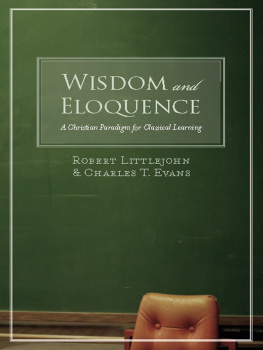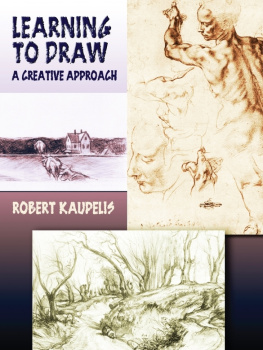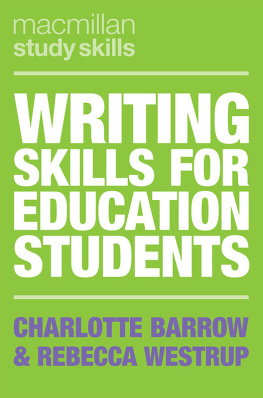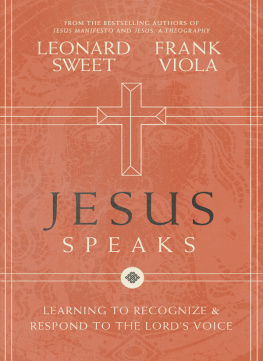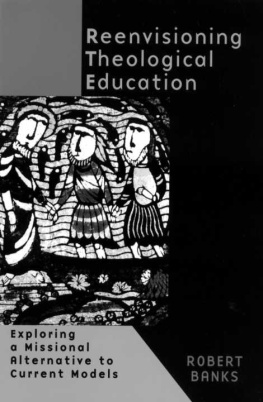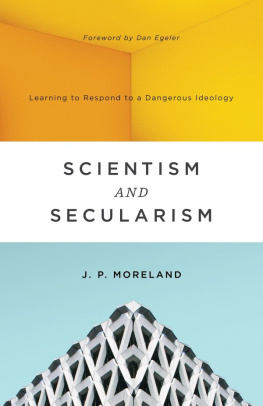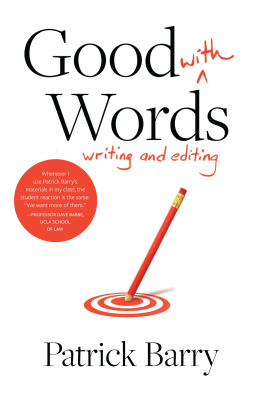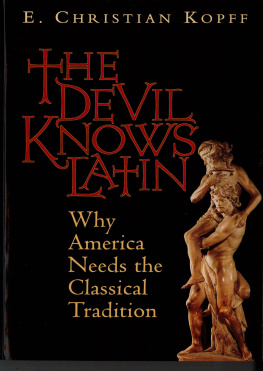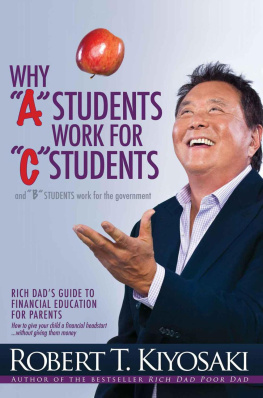Wisdom and Eloquence
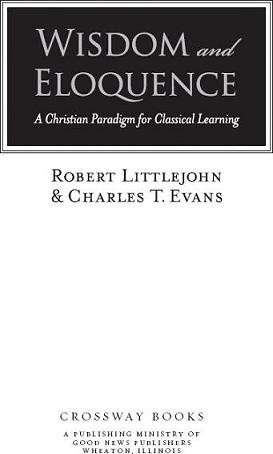
Wisdom and Eloquence
Copyright 2006 by Robert Littlejohn and Charles T. Evans
Published by Crossway Books
A publishing ministry of Good News Publishers
1300 Crescent Street
Wheaton, Illinois 60187
All rights reserved. No part of this publication may be reproduced, stored in a retrieval system or transmitted in any form by any means, electronic, mechanical, photocopy, recording or otherwise, without the prior permission of the publisher, except as provided by USA copyright law.
Cover design: Jon McGrath
Cover photo: Getty Images
First printing, 2006
Printed in the United States of America
Unless otherwise indicated, Scripture quotations are taken from The Holy Bible:English Standard Version. Copyright 2001 by Crossway Bibles, a publishing ministry of Good News Publishers. Used by permission. All rights reserved.
Library of Congress Cataloging-in-Publication Data
Littlejohn, Robert, 1955
Wisdom and eloquence: a Christian paradigm for classical learning / Robert Littlejohn and Charles Evans.
p. cm.
ISBN 13: 978-1-58134-552-0
ISBN 10: 1-58134-552-6 (tpb)
1. Church and education. 2. Religious educationPhilosophy. 3. Education, Humanistic. 4. EducationAims and objectives. I. Evans, Charles, 1967. II. Title.
LC368.L58 2006
370.112 - dc22 2006001820
CH 16 15 14 13 12 11 10 09 08 07
06 15 14 13 12 11 10 9 8 7 6 5 4 3 2 1
We dedicate this work to
DAVID, KATELYN, KATHERINE, MAURA, PATRICK,
ROBERT, AND THOMAS,
all of whom have benefited from a
12-K liberal arts and sciences education
CONTENTS
The Liberal Arts Tradition in the Public Square:
A Historical Apologetic for the Liberal Arts
THE AUTHORS HAVE many people to thank for their contributions to the extended learning process that has resulted in our writing Wisdom and Eloquence. We deeply appreciate the daily iron sharpening iron provided us by the faculty, staff, board, students, and parents of New Covenant Schools of Lynchburg, Virginia, Faith Christian School of Roanoke, Virginia, Covenant College of Lookout Mountain, Georgia, St. Timothys-Hale School of Raleigh, North Carolina, Regents School of Austin, Texas, The Arrowhead University Consortium of Minnesota, and Trinity Academy of Raleigh, North Carolina. We are indebted to the many participants in forming conversations at the annual Society for Classical Learning conferences and other similar venues where late-night dialogue has crafted clearer understandings of the daunting prospect of providing young people an education we hadnt the privilege of gaining at their age. Finally, we appreciate the assistance of Steve Britt, Robin Davis, Bryce Carlisle, Melinda Delahoyde, Rod Gilbert, E. Christian Kopff, Renee Skinner, and Paul Ziegler in offering their critical review of the manuscript.
Apart from the generosity of these many colleagues, there could be no Wisdom and Eloquence. We offer them our humble gratitude.
EDUCATIONAL ECONOMICS
DEMAND AND SUPPLY
WHY ANOTHER BOOK ON education and, in particular, another book on Christian education? Because things keep changing, and we believe that, of all people, Christian educators must be responsive to societys changing needs so that our graduates are prepared to make a difference in the world in which they live. We need to be habitual about improving the quality of the education we provide, not only with respect to how we teach, but also with respect to what we teach. In the pages that follow, we advocate a timeless system of education, the core of which hasnt changed for centuries and does need not to change in order to meet the changing needs of society. But the ways we go about implementing this system and the emphases we place upon the various dimensions of the system must be flexible to achieve the essential ends of the education we provide.
But what has changed? On a practical level, the economic environment in which our graduates must function is vastly different from that encountered just a short generation ago. With 75 percent of todays workforce being characterized by management guru Peter Drucker as knowledge workers, the value of raw human intellectual capital is at an all-time high. The demand for mere training in a particular trade or craft has faded with the industrial age, rendering the educational paradigms that catered to such demand obsolete. Instead, the need for men and women who can think outside the box pervades the American business culture. Further, between the mass outsourcing of production and services to other countries and the gradual consumption of American companies by foreign private and government investors, there is increasing demand for those who can function and succeed in a global economy. Meanwhile, the majority of new jobs at home are being generated by small start-up businesses, putting the creative entrepreneur in the drivers seat, not only for the creation of wealth, but for local and regional economic development across much of our nation. And with the bulk of these ventures involving technology, biotechnology, or some other form of applied science or engineering, there has never been a greater demand for a deepening understanding of mathematics and science among American adults.
At the same time, big company scandals involving cooked books and insider trading have punctuated the desperate need for a generation of business and political leaders who consider ethics to be as important to the corporate and political landscape as the related economic and political agendas. In short, our nation is crying for leaders who possess the knowledge, skills, and virtues necessary to function, communicate, and succeed in the face of never more rapidly expanding information and communication technologies and never more rapidly changing circumstances.
On a deeper level, truth has changed. That is to say, the way most people in our contemporary culture perceive and process truth is profoundly different from how it was before. Until the dawn of the Enlightenment, faith constituted the major means of knowing truth, but with that dawning, modernism reigned supreme as the primary epistemology in American and European culture for two centuries. Perceived truth was apprehended on the basis of rational, empirical, scientific authority. What could be supported rationally must be truth. However, over the last several decades modernism has been supplanted in our global culture by its nameless successor, postmodernism. For the postmodernist, rational arguments no longer convince, and authority is essentially located in oneself. If I can be persuaded that something is true, then it is truth. The truth I embrace may be different from (even contradictory to) someone elses truth, and that is okay. So believe the postmodernists. As Christians, we may bristle at such thinking, but the sad reality is that our children are terribly vulnerable to the pervasive influences of postmodernism in their world.
So, this significant cultural change poses the deeper educational demand, since education is more about cultural relevance than about attaining economic advantage. We want to prepare our graduates not only to make a living, but also to make a profound difference in the world into which they emerge and in the world that emerges over the course of their lives. We must guide them through the often difficult process of acquiring the skills, knowledge, and virtues necessary for the task.
So what are the essential qualities that our graduates must possess to make the kinds of culturally relevant contributions that we describe? We propose that these essential qualities are the very same as those indicated by St. Augustine of Hippo nearly 1,600 years ago-namely
Next page
